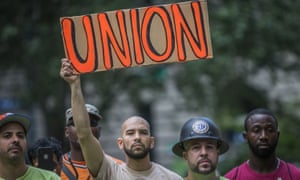
No one concerned about equality can deny that we live in a racist and sexist society. Unfortunately, substantive ideas of what we are to do about it are in short supply from American liberals.
For writers such as Ta-Nehisi Coates, racism won’t ever go away. It’s a kind of original sin, to be atoned for, not vanquished. For Hillary Clinton, her best 2016 campaign pitch involved reminding voters that Wall Street regulation wouldn’t end racism, sexism or LGBT oppression.
Those conclusions suggest that we should just try to cleanse ourselves of our own prejudices and try to raise the consciousness of those around us. “Diversity trainers” and consultants might be satisfied with that strategy, but the rest of us shouldn’t be.
Luckily, we already have a fantastic tool for fighting racism and sexism – it’s just not a tool that a newly “intersectional” liberal establishment is willing to wield. Unions. Beyond just giving everyone more money and job security, collective bargaining agreements won by labor unions radically reduce the wage gap between men and women, as well as those between white and non-white workers.
Female union members earn $224 a week more than non-union women workers. They still, however, get paid 12% less than their male counterparts. That’s an intolerable divide, but one that compares well to the 18.4% less than non-union women earn. The gains are even more substantial for black and Latina women. Latina union members take home 36% more than Latina non-union members. For black women union members, it’s 23% more than non-union members.

As Jake Rosenfeld and Meredith Kleykamp point out, when President Franklin D Roosevelt signed the National Labor Relations Act in 1935, which guaranteed the right of private sector employees to collectively bargain, less than 1% of black workers were in unions. By the early 1950s, 40% of black males working in the private sector were unionized. This high level of union membership wasn’t an accident – excluded groups consciously used collective bargaining to fight against discrimination and win a better position in the labor market.
The type of anti-racism that could materially improve lives, in other words, has always flowed through economic struggles. As Martin Luther King Jr put it in 1967: “We aren’t merely struggling to integrate a lunch counter now. We’re struggling to get some money to be able to buy a hamburger or a steak when we get to the counter.”
Unlike other countries, the United States didn’t have its own labor party. But union organizers and civil rights leaders pressured the Democratic party into carrying out some of the reforms that social democrats implemented elsewhere. In turn, working-class Americans of all races supported the party through its longest spell of political dominance.
It was always an uneasy alliance, however. Democrats relied on working-class votes to win elections, but the Democratic coalition also included powerful corporate interests – even big oil and General Electric – who really called the shots. And when economic growth slowed in the 1970s and business wanted to restore profitability off the backs of workers, the party quickly abandoned its promises of shared prosperity and equality and did capital’s bidding.
The Democratic party is still led by the currents that led this charge. Hillary Clinton was on the Walmart board from 1986 to 1992, while the corporation launched anti-labor union campaigns. In her future Senate campaigns, she got upwards of $25,000 in contributors from the company’s executives, lobbyists, and political action committee. Under Bill Clinton’s tenure as governor, Arkansas had the worst record in the country for worker safety. It wasn’t just a family affair: Democrats across the country took the lead forcing unions to make painful concessions and clearing the way for corporate dominance.
The rollback has had millions of victims – not least of all minority workers. Deunionization has cost black men around $50 a week – often the difference between food and housing security and deprivation. In the meantime, Democrats had to find a new pitch to keep voters turning out. They promised to better “represent” and “include” minorities and women, all the while undermining the social programs and unionized employment that actually gave oppressed people a shot at a better life. It’s no surprise that millions of black and brown voters have simply stopped turning out to vote.
And this is where establishment liberal politics finds itself today. It knows it can’t deal with class inequality because that means taking on capital, so instead it issues platitudes about racism and sexism. But dealing seriously with oppression means distributing wealth and power (currently held by economic elites and not less oppressed workers) to the working-class victims of racism and sexism. That means confronting corporate interests.
Without the will and desire to pursue that course, we get a professional middle-class anti-racism that is just about speaking out about racist “micro-aggressions”, watching movies with female-led casts and trying to poke holes in the popular universalist politics that could actually change lives.
If liberals want to fight oppression they need to start talking about how to revive our unions and turn them into vehicles for a majoritarian movement for justice. Until they do that, we shouldn’t take anything they say about racism and sexism seriously.
source:-theguardian


